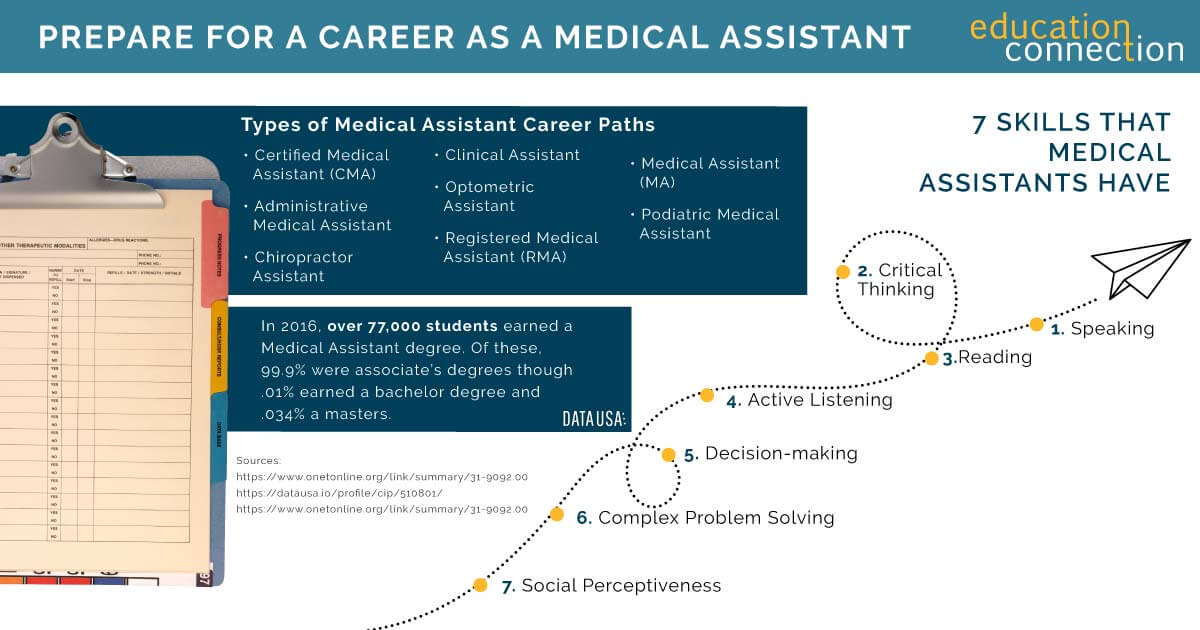WHAT IS A MEDICAL ASSISTANT?
Medical assistants (MAs) are the people who greet you at the front desk of a doctor’s office. They help out on other health care teams too. Some of what MAs do is take care of office tasks. Things like setting up appointments. Yet other skills involve simple patient care duties. Things like taking down your vital signs. It is also important to note that 65% of MAs have earned a post secondary certificate. These certificates may be completed as an online medical assisting program, or in a local campus.
Often the role a medical assistant plays varies on where they work. But they are always supervised by a licensed health care provider. No matter where the job, MAs have a lot to offer. Because of this, their skills are in demand. Reports show a surge of 15% job growth over the next few years. If you’re thinking about it, you’ll want to find out how to prepare.

MEDICAL ASSISTANTS: A RANGE OF POSSIBILITIES
MEDICAL ASSISTANT RESPONSIBILITIES
- Record patient history
- Answer telephones
- Arrange lab services
- Enter & update health records
- Schedule appointments
- Measure vital signs
WHERE MEDICAL ASSISTANTS WORK
Others work in hospitals, labs and in dental offices.
TYPES OF MEDICAL ASSISTANTS
- Administrative MAs
- Clinical MAs
- Specialized MAs
- Registered MAs
MEDICAL ASSISTANT ONLINE PROGRAMS
Medical assistant online classes help you learn the basics of health care. Some courses study the body and its systems. Others focus on medical words and their meaning. You may also become familiar with the names of different drugs and lab tests.
Time spent in the lab is more hands on. These courses are all about using the tools of the trade. Things like preparing blood samples for the lab. Or, you may learn how to use software like electronic health records (EHRs).
Working With Patients
You may also study how to deal with patients. This may mean that you learn how to measure vital signs. Or, the best ways to greet patients and check them in. As a result, you’ll have a deeper sense of how to communicate with clients in an ethical and professional manner.
It’s likely you’ll also study some of the day to day office procedures. These courses often ready you to schedule appointments. And, do things like assist with patient insurance claims and use medical coding.
Some schools have course plans that serve as study guides. They often ready grads to take industry exams. Apart from classes, your program may ask you to do an externship. This is one way to apply classroom learning in real time. As an online student, you may be able to do this in a nearby clinic or doctor’s office.
1
Southern New Hampshire University
- Take advantage of some of the nation’s most affordable tuition rates, while earning a degree from a private, nonprofit, NEASC accredited university
- Qualified students with 2.5 GPA and up may receive up to $20K in grants & scholarships
- Multiple term start dates throughout the year. 24/7 online classroom access.
Popular Programs
Business Administration, Psychology, Information Technology, Human Services…
2
University of Arizona Global Campus
- 99% of University of Arizona Global Campus students study online
- University of Arizona Global Campus offers affordable tuition, so college is accessible to many students.
- he University of Arizona Global Campus (formerly Ashford University) is accredited by WASC Senior College and University Commission (WSCUC)
Available Programs
Accounting and Finance, Information Technology, Political Science…
3
Western Governors University
- Award-winning programs created to help you succeed.
- A quality education doesn’t have to be expensive. Earn an accredited degree for less.
- Programs start monthly – Apply free this week!
Sponsored Schools
WHAT COURSES MIGHT I TAKE IN A MEDICAL ASSISTANT PROGRAM?
We’ve compiled a sample course plan to help you get an idea of what you may study in a medical assistant program. Since each school has unique courses, make sure to look at their syllabus. This way you’ll see if it agrees with your goals. Some of the best online medical assistant programs offer classes like:
Some common courses include:
Anatomy: Learn about the human body's systems. These courses are made to educate MA students about the parts and structures that make up the human body.
Patient Care: Explore the techniques used for performing direct patient care. These courses will allow you to be prepared to work in the field. During this course, MA students are shown how to perform patient assessments, get vital signs and gather medical history.
Office Administration: Learn the clerical skills needed to work as an MA. This course teaches students how to successfully manage a doctor's office. Students are shown how to manage a patient and office schedule.
Medical Terminology: Understand the medical terms used when talking about patients, treatments, medicine and conditions. Definitions and correct spelling of the words used in health care are taught in this course.
HOW LONG DOES IT TAKE TO BECOME A MEDICAL ASSISTANT?
Diploma and certificate medical assistant programs may last between 10 months and 1 year. Full time students going for an associate’s degree often take about two years. Students who’ve earned a certificate may be able to complete their degree quicker.
Types of Medical Assistants
Registered Medical Assistant (RMA) – The American Medical Technologists offers the RMA exam. You’ll need to meet one of four eligibility paths: (1) education, (2) military, (3) work experience, (4) instructor. The RMA credential is good for 3 years and then you’ll need to re certify.
National Certified Medical Assistant (NCMA) – The National Center for Competency Testing offers the NCMA exam. To take it, you’ll need to be a current student or graduate of an NCCT authorized school. Others with two years of work or some military experience may also be able to take it. Once you have the NCMA, you will need to keep your status active.
Certified Clinical Medical Assistant (CCMA) – The National Health Career Association offers the CCMA and Certified Medical Administrative Assistant (CMAA) credentials. Once you have passed your exam, the cert will be active for two years. To stay current, you’ll need to complete continuing education and renew.

MEDICAL ASSISTANT DEGREE PROGRAMS EXAMPLES
| School | # of Credits Required | Start Dates | Minimum Months to Complete |
| Rasmussen College | 38 | Multiple | 9 |
| Ultimate Medical Academy | 61 – 62 | Multiple | 18 – 21 |
| Trident University | 36 | Multiple | 12 |
HOW MUCH DOES MEDICAL ASSISTANT SCHOOL COST?
Some schools have two prices for online MA programs. One for in state and the other for out of state residents. Recent data lists the average out of state tuition as $17,397. This cost is on the rise by 0.406%%. The average in state tuition which is $4,187 is also increasing (by 9.44%).
At college, you’ll pay for the credits you complete. In other words, if you pursue a certificate, it may cost less than an associate’s degree. And, certificates need fewer courses.
Many schools offer ways to save. Military and veteran students are often able to get a lower rate. Or, they may have credit transfer policies. This means using prior credits, so you’ll have less to do and less to pay for. Make sure to also know what the fees are to graduate. Course materials are extra too.
Apart from these expenses, you may need to pay to take industry exams. Plus, you’ll pay a fee for your certification and to renew it. The CMA exam can cost $125 if you’re a member of the AAMA or a CAAHEP or ABHES completing student or recent grad. You can check these figures on each of their web sites.
TOP ONLINE MEDICAL ASSISTANT SCHOOLS
According to the data, the largest share of schools with MA programs are public, 2 year schools (404 total). Those schools awarded 54,553 degrees to students. The majority of these were associate’s degrees. Not all of these awards were online medical assistant programs.
| School | 2022 Degrees awarded | 2023/24 Tuition (out of state unless *) |
| San Joaquin Valley College Modesto | 115 | $17,655* |
| Charter College | 553 | $18,678* |
| ECPI University | 333 | $18,484* |
| Florida Career College-Houston | 367 | $21,500* |
| Ivy Tech Community College | 529 | $9,465 |
| ASA College | 172 | $12,728* |
*Estimated for full time, starting undergrad students
MEDICAL ASSISTANT CERTIFICATION: DO I NEED TO BE CERTIFIED TO BECOME A MEDICAL ASSISTANT?
Can you be a medical assistant without certification? That depends on the state. In some states, MAs have to graduate from an accredited program, pass an exam, or both. In other states, formal education is not required. That said, today’s employers tend to prefer grads of medical assistant programs.
To set yourself apart, you may pursue a post degree cert. It’s voluntary but shows others you have dedication and skills. Plus, standards are changing. As such, certified MAs may have a wider scope of duties than others. You should contact your state board of medicine for more details.
TYPES OF MEDICAL ASSISTANT CERTIFICATES
Medical Administrative Assistant Certificate: A focus on how to manage an office. You’ll study things like patient privacy and data security. This may suit you if you have strong people skills and prefers office tasks.
Medical Billing and Coding Certificate: This may suit you if you like to use computers. You may focus on software and systems. Courses may ready you to take the Certified Coding Associate (CCA) or CCS cert exam offered by AHIMA also known as the American Health Information Management Association.
A.S. Health Sciences – Medical Administrative Assistant: Courses may prepare you to take the Certified Medical Administrative Assistant (CMAA) exam. Pursuing a full degree also leaves the door open to future studies. You may decide later to work towards a degree such as a Bachelor of Science in Health Science or in Health and Wellness.
Medical Office Administration Certificate: Study the ins and outs of insurance processing and other office tasks. May also ready grads to sit for Certified Medical Administrative Specialist (CMAS), CCA, National Certified Medical Office Assistant (NCMOA) exams.
WHAT CERTIFICATION SHOULD A MEDICAL ASSISTANT HAVE?
The Certified Medical Assistant (CMA) is well known. It is available through the American Association of Medical Assistants (AAMA). To be able to take this exam you will need at least a high school diploma. Graduating from an AAMA approved school is also a must. The two agencies who accredit medical assisting programs are:
- Commission on Accreditation of Allied Health Education Programs (CAAHEP)
- Accrediting Bureau of Health Education Schools (ABHES)
CMA applicants also need to complete a practicum (unpaid, supervised). The credential is valid for 60 months, so you’ll have to renew it.





